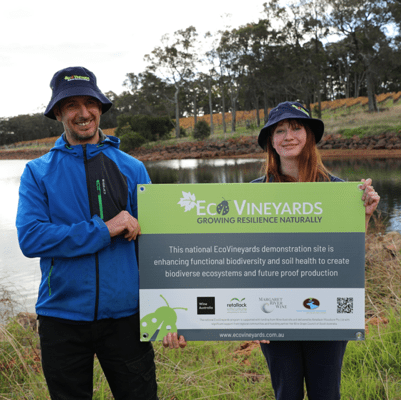Tell us in a few sentences about your experience as a viticulturist, how did you arrive here?
Wayfinder is a new player in the prestigious Wilyabrup area of the Margaret River Wine region. Our 40-hectare Certified Organic (ACO) vineyard of mature vines is located just 7 kilometres from the Indian Ocean and enjoys a maritime climate.
At Wayfinder, we aim to build and support organic and resilient farm communities, focusing on biodiversity & growing high-quality fruit. Many of our vines were planted in the late 90s and were conventionally managed until 2018.
When we became custodians in 2019 our desire to question traditional methods led us to the organic conversion of the farm and to explore projects that strive for minimal intervention. Through collaboration, continued learning and experimentation, we aim to work at the leading edge of Viticulture.
We are working to create a legacy of considered, authentic action, that preserves and restores connections to flora, fauna, land, and community.
Why did you decide to apply to be an EcoGrower, was there something specific that influenced your decision and/or had you attended a previous EcoVineyards session?
We were drawn to the EcoGrowers program because of the structured framework, support, and community it would provide as we continued on our mission to constantly improve balance and biodiversity in our agricultural system.
The program’s emphasis on science-based decision-making and innovation will help guide and improve our practices as will the opportunity to collaborate and connect with other growers facing the same challenges we are.
We are grateful and excited to have this opportunity.
Has there been a defining moment or catalyst for you to move towards more ecologically driven viticultural practices?
We had always intended for our vineyard to be certified organic, it was part of the plan all along… although we hadn’t realised how hard it would be. We were encouraged to move further down the ecological viticulture path by visits to other organic farms. Their talented teams generously shared their experiences of crops thriving with organic practices and good common sense. Looking at the soil and diversity of their farm ecosystems motivated and inspired us.
Can you provide a brief overview of your project ideas, and what you wish to achieve over the 3 years and why is this important to you?
We have an ongoing revegetation commitment for our farm, and want to continue to move away from a monoculture approach to farming. In the last few years, we have planted over 50,000 native trees, grasses, and shrubs.
We’re looking to expand our plantings as well as trialing designated native insectaries undervine, mid-vine row and at vine end caps to encourage predatory bugs that may help control mealybugs, moths or thrips.
Are you just starting to learn, or have you been enhancing biodiversity on your property and is this an extension of what you are currently doing?
We had already made a start but are always learning and challenging our preconceived ideas and past practices. The EcoGrowers program will help us to extend and improve our current initiatives. We want to leave our patch a little better than when we arrived.
Tell us about your hidden superpowers, something that others don’t know about you or a practice you would like to champion?
On your farm, you need to find the combination of ingredients that help nature work best for you and enhance your site. Sometimes you have to wait like you would for a stew, and a pinch of spice makes all the difference.
We believe our ‘stew’ is the way we patiently look after the vines all year long and our ‘spices’ is the micro-organisms in the soil which enrich and enhance the vines.
Where do you see grape growing in the future, do you feel there is an urgency to change current practices? If so, why?
We have a core belief that a wine business must operate with the highest environmental standards if it is to thrive and survive, as consumers and employees increasingly demand higher social and environmental standards.
It’s essential for us to keep innovating and challenging our practices to constantly improve our sustainability and resilience.
What else would you like to share with the broader EcoVineyards community, what gets you excited about the future?
Organisations like EcoVineyards and programs like EcoGrowers provide a fantastic opportunity to learn and share and are invaluable to our communal success as well as long-term environmental protection and preservation.

